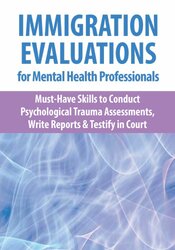
×

There are thousands of people right now that have been exposed to hellish environments of terror and abuse hoping to find safety in America.
A 16-year-old fleeing violence and separated from his family. A woman whose family has declared an ‘honor killing.’ Families fleeing political, racial or religious violence and terrorism. The survivors of human trafficking.
In most cases the authorities and native governments will not, or cannot, protect these individuals.
But you can.
As a mental health clinician, you can be the difference between safety and being returned to life threatening situations.
I’m Marc Sadoff, LCSW. I’ve been doing psychological evaluations for clients in immigration court for decades. It’s been one of the most rewarding experiences I’ve had as a therapist.
And in my comprehensive training I’ll show you everything you need to start doing psychological assessments with immigrant teens and adults facing deportation. You’ll end this program ready to handle many of the most common cases you’ll see including asylum, Violence Against Women Act (VAWA) and T & U cases of trafficking.
We’ll cover it all from how to conduct interviews, write the reports, and confidently testify in court.
And, if you’re anxious about testifying, don’t worry. There are many types of cases you can take that DO NOT REQUIRE you to testify!
I’ll even show you how you can build relationships with attorneys in your area that make it simple to market your new services.
Other trainings on immigration evaluations are asking up to $1800…but you can join me, and start doing this work right away, for a fraction of the cost. And with videos that provide you a real sense of what to do in the interview room, a complete set of templates and forms, and access to ongoing consultation sessions, this program is every bit as comprehensive.
So don’t wait. This is your chance to expand your expertise, clinical practice and revenue base…maybe even preserve a life.
Register today!
Marc Sadoff, LCSW
All members of the PESI, Inc. planning committee have provided disclosures of financial relationships with ineligible organizations and any relevant non-financial relationships prior to planning content for this activity. None of the committee members had relevant financial relationships with ineligible companies or other potentially biasing relationships to disclose to learners. For speaker disclosures, please see the faculty biography.
Continuing education credit information is coming soon for this live webcast.

Marc Sadoff, LCSW, is a therapist in the Los Angeles area who has trained hundreds of licensed clinicians how to conduct psychological evaluations for immigration cases of asylum, VAWA, U Visa, T Visa, and hardship. Now in private practice, Marc previously worked with the Program for Torture Victims Los Angeles providing psychological and medical evaluations to corroborate claims of torture for asylum seekers. He is a contributor to the book A Health Professional’s Guide to Medical and Psychological Evaluations of Torture and has presented at the Institute on Violence, Abuse and Trauma International Conference on helping refugees avoid deportation through psychological evaluations. Marc has worked with individuals from diverse backgrounds, including refugees, victims of human trafficking, and those seeking protection from persecution in their home counties. His empathetic and compassionate approach, combined with his attention to detail and thoroughness in evaluating cases, has earned him a stellar reputation in the immigration law community.
Speaker Disclosures:
Financial: Marc Sadoff maintains a private practice and receives compensation as a consultant and trainer. He receives a speaking honorarium and recording royalties from PESI, Inc. He has no relevant financial relationships with ineligible organizations.
Non-financial: Marc Sadoff has no relevant non-financial relationships.
For live CE credit, you must watch the live webcast in its entirety at its scheduled time and complete the CE quiz and evaluation within one week. You will have access for 90 days after the program for review.
Please note: There will be a 70-minute lunch and two 15-minute breaks; one in the morning and one in the afternoon. Lunch and break times will be announced by the speaker and at their discretion. A more detailed schedule is available upon request.
Visit our FAQ page at https://www.pesicanada.ca/faq or contact us at https://www.pesicanada.ca/contact-us.
Introduction to Immigration Evaluations
Cultural Competence in Immigration Evaluations
Preparing for and Conducting the Interview
Report Writing and Documentation for Immigration Evaluations
Preparing for and Providing Expert Testimony in Immigration Court
Self-Care and Vicarious Trauma for Evaluators
Satisfaction Guarantee
Your satisfaction is our goal and our guarantee. Concerns should be addressed to info@pesicanada.com.
Please wait ...